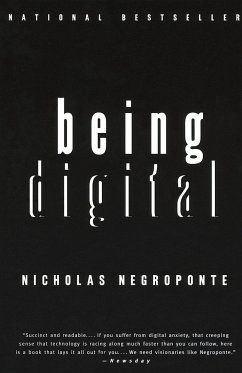Being Digital decodes the mysteries and debunks the hype surrounding bandwidth, multimedia, virtual reality, and the Internet. It forecasts technologies that will make your telephone as context-sensitive as an English butler and replace TV broadcasters with intelligent "broadcatchers" that assemble and deliver only the programming you want. And this book suggests what being digital will mean for our laws, education, politics, and amusements - in short, for the way we live.
In lively, mordantly witty prose, Negroponte decodes the mysteries--and debunks the hype--surrounding bandwidth, multimedia, virtual reality, and the Internet, and explains why such touted innovations as the fax and the CD-ROM are likely to go the way of the BetaMax. "Succinct and readable. . . . If you suffer from digital anxiety . . . here is a book that lays it all out for you."--Newsday.
In lively, mordantly witty prose, Negroponte decodes the mysteries--and debunks the hype--surrounding bandwidth, multimedia, virtual reality, and the Internet, and explains why such touted innovations as the fax and the CD-ROM are likely to go the way of the BetaMax. "Succinct and readable. . . . If you suffer from digital anxiety . . . here is a book that lays it all out for you."--Newsday.








